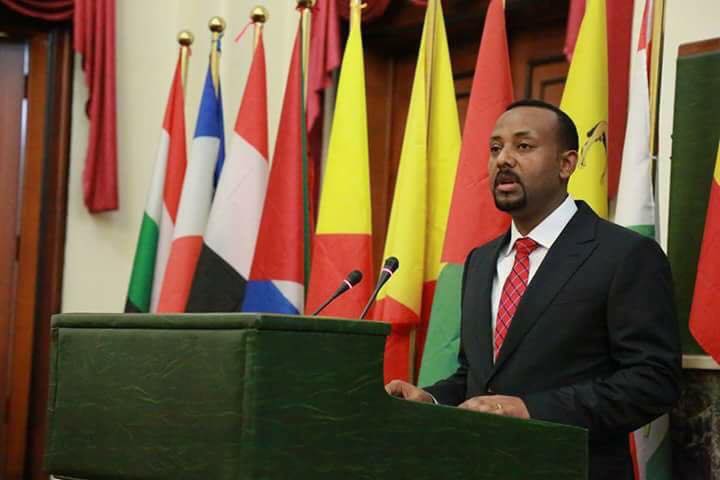On April 2, 2018, a remarkable peaceful transfer of power was made in Ethiopia when Dr. Abiy Ahmed assumed his new position as Ethiopian Prime Minister, following the unprecedented action of former Prime Minister Hailemariam Desalegn when he voluntarily stepped down from that position, hoping to make way for peaceful democratic reforms.
Prime Minister Abiy Ahmed then gave a historic speech before the Ethiopian Parliament, unlike any other in the last fifty years. The vision he laid out was clearly an Ethiopian vision, which affirmed the innate dignity of all Ethiopians, regardless of ethnicity, religion, gender or other differences, the foundation of each person’s right to freedom, justice, the rule of law and protection from corruption and robbery.
He spoke of the need to promote good economic policy, to provide increased technology to the agricultural sector, to the importance of investing in education and to the government’s role in serving the people instead of the other way around. He also recognized the many Ethiopians who have sacrificed in defense of the country in the past and he apologized to the family who lost their love ones. He called on the people of Ethiopia and in the Diaspora—including the youth— to partner together in the challenging job of building a better country.
The speech was filled with hope for a better future for all Ethiopians, exceeding the expectations of almost everyone. He especially noted the contribution of women and acknowledged the significant contribution made by our youth in pushing for democratic change and their rejection of the current autocratic system. Before the Ethiopian Parliament and the people of Ethiopia, he affirmed that their demands for freedom and justice were legitimate. After nearly three years of protests and the loss of countless lives, his vision for Ethiopia clearly embraced their aspirations; yet, the changes these youth seek are not new.
In the past, the Ethiopian youth of the day laid much of the groundwork for change, similar to the youth of today. In fact, it has nearly always been the youth, our biggest collective group, who have paid the price with their lives. This happened during the student movement of the seventies and again when Mengistu was overthrown; but both times, the efforts to bring change did not lead to a better Ethiopia. What went wrong? What can the youth of the past say to the youth of today? How can they work together to bring a better future to the youth of tomorrow? How can trust be rebuilt so we can join together to support this new vision for a better Ethiopia?
We should not let this opportunity pass by; nor should we fail to learn from prior mistakes, leaving the youth of the future to recycle the same struggle. Will the new prime minister’s bold and reconciliatory vision be widely embraced or will most take a “wait and see” approach, sitting by until the new prime minister “proves himself?”
This is a highly challenging political environment for such change, making the task even more daunting; yet, there is a new opportunity and if Ethiopians empower the momentum, we may overcome the obstacles. With God’s help and unity around the principle-based vision PM Abiy proposed; it may very well succeed; however, without that support, there are forces that may undermine its success.
If we do not “do the work” now, and it fails, it will be our own fault. Neither can we stop our effort until it is sustainably entrenched in the framework of our society and protected by strengthened institutions and a participatory democracy. No one, even the prime minister, can do it alone without the backing of the people.
We all must be involved so as to hold all of us accountable, including PM Abiy, his cabinet, the EPRDF, the Ethiopian Parliament, regional leaders, local leaders, our institutions and ourselves to a higher vision for a better Ethiopia. Will you be part of this?
The new prime minister’s strong embrace of a new paradigm of thinking is a dramatic positive shift in direction that may avert the dangerous downward descent of the country into ethnic-based conflict and destruction. Any system, like ours, that is heavily slanted to unfairly favor one group over all others, like the TPLF dominated EPRDF, will certainly become its own source of conflict, with constant threats and challenges to its continued existence.
We should all expect a clash of paradigms between the Ethiopian vision presented by the new prime minister and the old paradigm of ethnic federalism, which mainly supports one group, the TPLF, who have dominated the EPRDF. We hope the members of the EPRDF and others, will not be among those seeking to take the place of the TPLF, but instead will be the first to call for a new structure that opens the political space to representation from all Ethiopians. Unfortunately, we expect some resistance from at least two opposing groups.
1) The TPLF and their supporters: The existing TPLF power-holders and their cronies resisted PM Abiy’s election as chairman of the EPRDF and his appointment as prime minister, fearing genuine change; however this present arrangement may become the most favorable exit plan that would provide them with the most peaceful transition to a genuine democratic model where they could also benefit. Right now, they may not recognize this golden opportunity before them; and instead, resist it and try to block PM Abiy at every attempt to bring real democratic reforms.
2) Ethno-nationalists: Those leaders and their supporters who see nothing wrong with the present model of the ethnic federalism of the EPRDF, may strongly oppose PM Abiy’s Ethiopian vision and see him and his vision as obstacles to their goals. Ironically, they may share a like-minded ideology to the model of the status quo, contrary to the rising numbers of Ethiopians who now support freedom, justice and opportunity for all the people of Ethiopia.
Both of these groups, although themselves vying for power, could attempt to undermine the vision of the new prime minister and of the majority of Ethiopians, believing their survival and advancement depends on owning the power, finding it hard to imagine an outcome that could be more beneficial to them in the long run— bringing more sustainable peace and security to all, including themselves.
This is a clash of paradigms should be played out not with guns in the streets, but instead at the round table through civil debate, evidence and the real needs of the people and country. The vision as laid out by the new prime minister is based on principles we in the SMNE heartily endorse— that every life is valuable, regardless of ethnicity or other differences, and that freedom and justice are not sustainable until freedom and justice come to all.
We should not “wait and see” when we have opportunity to advance our values and principles. If this opportunity is seized upon, it could become a win-win for all of us, including the TPLF and others holding to ethnocentric views and ambitions. If it is not seized upon, we may give opportunity to those who oppose it to once again hijack our hope and dreams for a better Ethiopia.
We all know that the newly elected prime minister has been part of the EPRDF system; and that he still is; but people need to know that the demands of people helped bring him to this position. He has taken a strong stand for democratic reforms, unlike any we have seen come from within the system, despite the resistance from some more entrenched in the system. He was not alone in bringing this outcome. Many others have worked together within the OPDO, the ANDM, the EPRDF and the Ethiopian Parliament to endorse not only PM Abiy, but this inclusive vision for all of Ethiopia.
Something new we are seeing is the insider movement within the system that is beginning to strengthen. Add to this momentum, the minorities outside of the EPRDF; had they been able to vote, many would have also stood by this ideological shift to a new broader vision for Ethiopia and away from the nations and nationalities approach that manipulated the model to favor a few.
Three years of pressure for change from our youth have played a significant role in bringing this new prime minister to this office, as efforts from other hard-working Ethiopians inside the country and in the Diaspora. For these reasons, we should not be quick to judge or do nothing to help after so many people have contributed to this outcome. Waiting and doing nothing can give the TPLF time to crush our shared hopes for a vision many of us have already been working to bring. If he and others are blocked from accomplishing this vision, Ethiopians should be ready to again speak out.
The TPLF want to slow down and silence the Qeeroo, Fano and Zerma youth, but to do so, a small space opened up for this new prime minister. This has happened before; but, each time the movement was crushed, like after the rigged 2005 election where the people almost brought down the TPLF. It happened again after the Muslim uprising when the TPLF were again able to crush the efforts of this powerful, peaceful movement for religious freedom. Then the Oromo youth rose up in 2015 in response to the Addis Ababa Master Plan that would force people from their homes and land. Many Oromo youth lost their lives.
That was followed by an uprising in Gonder on July 2, 2016, when Amhara leaders demonstrated unity of mind and purpose with the Oromo, claiming the Oromo blood was their own blood, that all political prisoners were their own, and that the grabbing of land in Gambella was like their own land had been taken. Such empathy and unity scared and challenged the TPLF, nearly bringing them to their knees before calling a State of Emergency for 6 months, and then extending it 3 more months. Deadly force and the imprisonment of thousands of youth and others crushed it, only for the youth to rise up once again.
The ruling TPLF should understand that the best way out of the ongoing power struggle is to actually satisfy the demands of the people for inclusive freedom, justice and opportunity. Without doing so, the conflict may gain momentum and erupt in a way that brings far more damage to our people and country.
The TPLF hardline approach is like the campfire you think you have extinguished, believing you left only the ashes; but with some slight breeze, some red ember reignites and out of nowhere, there is a fire, perhaps even bigger than the one you left. It can explode into a forest fire and get out of control if ignored.
Currently, the demands of the people have created new pressure for change. This time that ember led to the resignation of the prime minister, the release of thousands of political prisoners, another State of Emergency— which had to be rigged due to decreasing cooperation among EPRDF insiders— and now to the appointment of a new prime minister who has displayed the courage and wisdom to present a vision unlike any other. How many other embers are still ready to ignite if the vision of PM Abiy and the cooperative efforts of so many within and outside of the system, are blocked?
The unique advantage now is having a prime minister, someone on the other side, who is speaking the same language as the people and who seems to understand some ways to bring change. He has extended his hand out, and now the people must respond with the same if we are going to start a genuine dialogue that will lead to a process to bring meaningful democratic reforms, reconciliation and restorative justice.
Important next steps:
1. End the State of Emergency
2. Release all political prisoners
3. Call on all opposition to start a national dialogue
4. Reform the national security sector to reflect diversity of the nation.
These are things the TPLF would never willingly do unless there was pressure from the people, the international community and an effective organized body intensively working to make it happen.
This is why the “wait and see” approach is a death sentence to the peoples’ hopes and dreams; and instead, will empower the TPLF. The new prime minister has the title, but not the authority over the military, security forces, intelligence, judiciary, and other key components that are by law, supposed to be part of his position. The TPLF will not easily give over control, so there must be active support of him and what he is trying to do.
Those Ethiopians in positions of power, as well as intellectuals, visionaries, religious leaders, elders and other key people must help develop a framework leading to an inclusive national dialogue, reconciliation, restorative justice and democratic reforms so as to bring transformative change.
God has given us so many opportunities, but we wasted them or saw them sabotaged by personal or tribal ambitions. The rejection of the feudal system brought the communist government of the Derg— the Red Terror. The overthrow of the Derg brought the emergence of the present ethnic apartheid regime led by a liberation front called TPLF, which has divided the country, landlocked Ethiopia, deepened ethnic hatred to a point we have never seen before and robbed the country of many of its resources.
If we now miss this opportunity; we could get get more years of oppression under the TPLF; we could find ourselves under the domination of yet another tribal group, or something worse, including the widespread violence and destruction. The people have suffered for too long and deserve better than this. It is time for an Ethiopian vision.
May God strengthen and guide Prime Minister Abiy, the EPRDF, the Ethiopian Parliament, the TPLF, the TPLF Central Committee, the people in Ethiopia, including our youth, and those in the Diaspora, helping all of us to do what is right, good, loving, moral, brave, wise, and honorable during this critical time in the country. May God help us value the lives and rights of others, putting humanity before ethnicity or any other differences and caring about the freedom of each other, for no one will be free until all are free.








